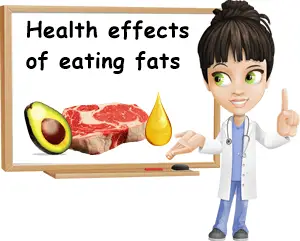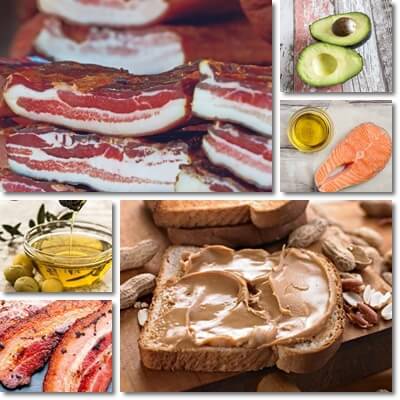Eating fats is not optional. Fat is an essential nutrient, meaning you need it to stay alive and function optimally. And despite the bad press it has enjoyed, it’s actually really good for you. Fat is responsible for tissue growth and repair. And it generates energy for the body to use, with adipose tissue serving as an energy storage so that when you’re sick with something and can’t eat, your body will draw energy from there to keep you functioning. Having some degree of body fat will determine fertility and chances of conceiving. Fats also synthesize hormones and neurotransmitters in the brain, determining everything from your mood to your metabolism and weight.
Of course, not all fats are good. While unsaturated fats like Omega-3 fatty acids are good for brain development and help lower total blood cholesterol and LDL cholesterol, trans fats resulting from food processing are best avoided because they cause heart disease. Saturated fats on the other hand, found in lard, butter, meat, whole milk and dairy or coconut oil, are best consumed in limited amounts.

Also, experts recommend fat intake not exceed 30% of all calorie intake. Provided there is a balance in one’s eating, healthy options are preferred and overall intake is kept relatively low, eating fats comes with a wide range of health benefits for the brain, nervous system, cardiovascular system, skin, fertility and digestion. So what are fats good for? The following are the top 11 benefits of eating sufficient, but not excessive amounts of mostly healthy fats:
1) Relieving constipation
Eating fats helps soften stools and makes them easy to pass, contributing to a mild laxative effect that helps relieve constipation. Fiber alone and a good intake of water are not enough for digestive health and bowel regularity because you also need small amounts of fat to smooth things along. It is actually possible to have a high fiber intake and a corresponding water intake and still experience constipation if you eat too little fat. Because it helps soften stools, eating fats is further beneficial for hemorrhoids.
2) Vitamin absorption
The reason why vitamins A, D, E and K are called fat-soluble is because they are absorbed and transported to where they are needed in the body via fats. In other words, fats boost the absorption of these vitamins. If we didn’t eat any, we wouldn’t be able to absorb or properly use vitamins A, D, E and K and experience problems with eyesight, immunity, skin, blood coagulation and inflammation. All carotenes, including beta-carotene, the most important precursor of vitamin A, are fat soluble as well. So when you eat carrots or sweet potatoes or greens, it’s enough to add a drizzle of olive oil, a small piece of butter or a tablespoon of avocado pulp to make sure your body actually absorbs the carotenes in them.

3) Antioxidant activity
Healthy fats hold important antioxidant activity. They deliver and ensure the absorption of antioxidants such as vitamin E which helps maintain cell membrane integrity, flexibility and permeability. In turn, antioxidants protect the fats and prevent their oxidation. Basically, fats exert antioxidant activity by delivering and introducing antioxidant nutrients such as vitamin E into cells and tissues to scavenge harmful free radical molecules and inhibit their formation. This results in reduced inflammation and, at a larger scale, lower risks of some chronic diseases.
4) Anti-inflammatory benefits
The healthiest forms of fats are polyunsaturated fats like Omega-3. A healthy intake of Omega-3 fats has been shown to inhibit the production of inflammatory elements such as inflammatory cytokines and result in improved symptoms of various inflammation-based diseases, including rheumatoid arthritis. Moreover, Omega-3 fatty acids, particularly the form from fish, DHA or docosahexaenoic acid, lowers total cholesterol and LDL cholesterol levels in the blood, decreasing the risk of atherosclerosis, stroke and heart attack.
5) Nourishment for the brain
Our brain is made of fats and it’s only natural it relies on them to function optimally. DHA Omega-3 fats are the most common fats in the brain and are essential for normal brain and nervous system development and function in children and adults. The cell membranes of our grey matter are particularly reliant on these fatty acids and it has been theorized that a healthy, moderately low intake of fats can contribute to better memory and thinking. Even less healthy fats such as cholesterol are vital for brain and nervous system health. Cholesterol helps make up the myelin sheath that insulates the tail of nerve cells. A too low a dietary intake increases the risks of degenerative diseases of the nervous system such as multiple sclerosis. Eating fats in general nourishes the brain and supports thinking, focus and memory while relieving brain fog for improved intellectual activity.
6) Protective role
Omega-3 fatty acids, especially the form from fish (DHA) promote cardiovascular health and contribute to skin health. Cholesterol protects against degenerative diseases of the nervous system such as multiple sclerosis. Fat deposits in the body are also used to insulate and maintain a certain body temperature as well as protect key organs from minor injury and trauma.
7) Healthy skin
Fats deliver vital nutrients for the skin. For example, a lot of vegetable oils and the seeds from which they are made, such as sunflower oil and sunflower seeds, are rich in vitamin E. With regards to skin health, vitamin E ensures the permeability of cell membranes and allows them to receive nutrients and water. At a larger scale, this helps achieve better looking, healthier skin with an optimal level of hydration. Moreover, both vitamin E and A which rely on fats to be absorbed, scavenge harmful free radical molecules responsible for early wrinkles and promote a youthful looking skin, full of radiance. Certain fatty acids like Omega-3 with their anti-inflammatory action may help prevent and improve skin conditions such as eczema or psoriasis.
8) Better vision
The foods containing the highest amounts of vitamin A are also significant sources of fats. Examples include: fish liver oil, fish and liver. The vitamin A these foods provide has a high absorption rate because it comes together with fats, so a maximum amount is absorbed and used for various functions in the body, especially good vision. At the same time, foods rich in the pigmented antioxidant called beta-carotene but with almost no fat content require eating fats to help the body absorb the beta-carotene and convert it into vitamin A.
Beta-carotene is found in food sources such as carrots, sweet potatoes, red peppers, pumpkin and green vegetables. Lutein and zeaxanthin are two carotene antioxidants that cannot be converted into vitamin A. However, they go directly into the retina and macula lutea region in the retina and protect vision from free radical damage. But in order to do so, they require eating fats.
9) Provides energy
As a macronutrient, fat serves the purpose of providing energy for the body to use for performing life-sustaining functions such as breathing, digesting etc. Eating fats is vital for keeping healthy and alive and a too low a intake can predispose to serious health issues over time.
10) Strengthens the body
Eating fats strengthens the body, making it more resilient to disease and infections and able to recover fully and completely. Having some degree of body fat is more useful than one can imagine. Say you have a bad stomach bug and can’t eat anything, only drink some water. It doesn’t matter because your body will tap into its fat deposits and make energy to keep you alive and functioning until you get well enough to eat again. Not to mention that fat deposits (and the liver) store the essential vitamins A, D, E and K so when your body taps into its reserves, it also releases stored nutrients, further contributing to a stronger, more resilient organism.
11) Hormone production and pregnancy
Fat and fertility go hand in hand. One of the main function of fats in the body is to synthesize hormones that are then involved in a variety of processes, from regulating mood to boosting fertility. Sufficient amounts of fat and fatty tissue help produce estrogen to boost fertility and favor pregnancy. Research shows that women with too little body fat (less than 10%) have trouble conceiving a baby. Having a healthy weight with a BMI (body mass index) of at least 20 can help you get pregnant faster.
And it’s not just about body fat percentage and pregnancy. While the sun helps you produce vitamin D, eating fats helps you absorb and use it. And studies suggest a too low a intake of fats negatively impacts vitamin D metabolism and can make it more difficult for you to get pregnant. Research has found receptors for vitamin D in the ovaries and uterus, more reason to consider its role in fertility and pregnancy. Different fats contribute to various aspects of fertility. For example, cholesterol helps synthesize vitamin D during sun exposure as well as fertility hormones and Omega-3 fatty acids promote normal brain development of babies in the womb. All in all, eating fats is good for fertility and pregnancy.
